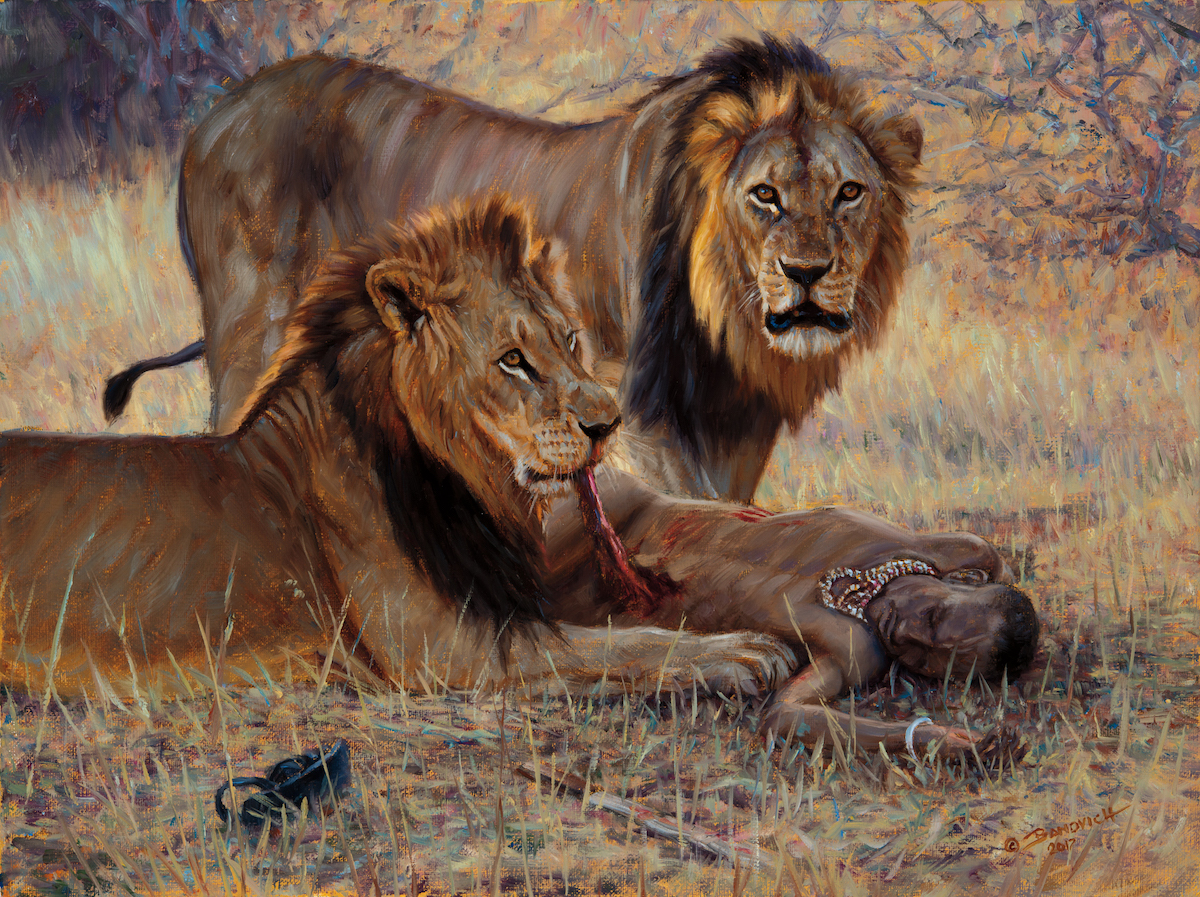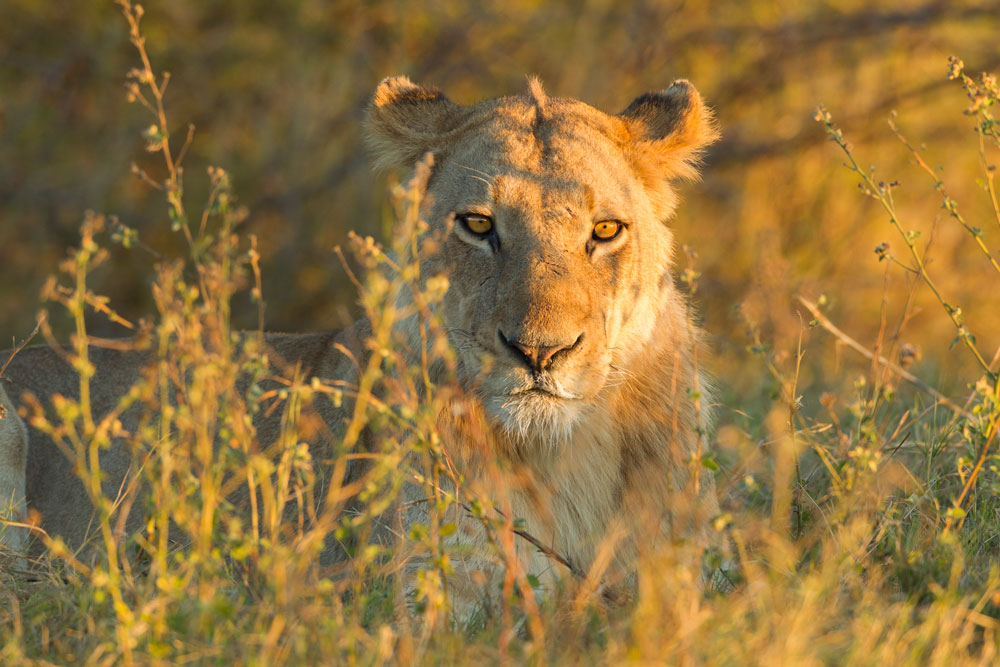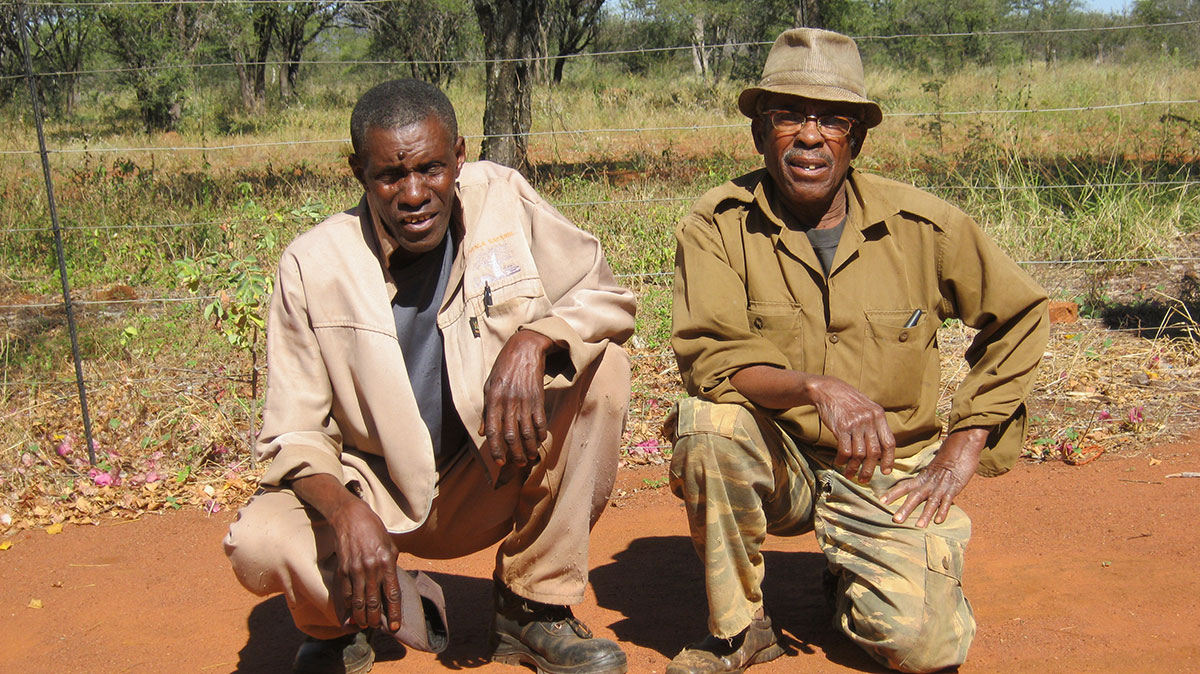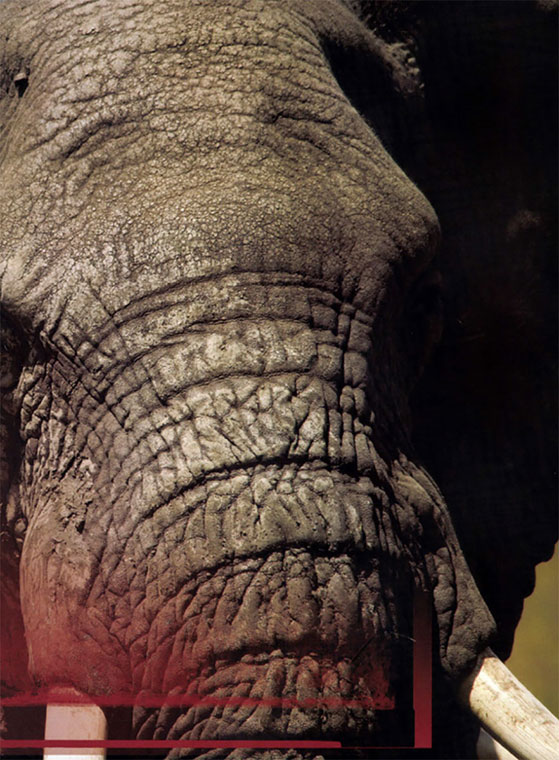It must not be imagined that with the death of the first lion our troubles at Tsavo were at an end; his companion was still at large, and very soon he began to make us unpleasantly aware of the fact. Only a few nights elapsed before he made an attempt to get at the Permanent Way Inspector, climbing up the steps of his bungalow and prowling round the verandah. The Inspector, hearing the noise and thinking it was a drunken coolie, shouted angrily, “Go away!” Fortunately for him, he did not attempt to come out or to open the door. Thus disappointed in its attempt to obtain a meal of human flesh, the lion seized a couple of the Inspector’s goats and devoured them there and then.
On hearing of this occurrence, I determined to sit up the next night near the Inspector’s bungalow. Fortunately, there was a vacant iron shanty close at hand with a convenient loophole in it for firing from. Outside this I placed three full-grown goats as bait, tying them to a half-length of rail weighing about 250 pounds. The night passed uneventfully until just before daybreak, when at last the lion turned up, pounced on one of the goats, and made off with it, at the same time dragging away the others rail and all. I fired several shots in his direction, but it was pitch-dark and quite impossible to see anything, so I only succeeded in hitting one of the goats. I often longed for a flashlight on such occasions.
Next morning I started off in pursuit and was joined by some others from the camp. I found that the trail of the goats and rail was easily followed, and we soon came up, about a quarter of a mile away, to where the lion was still busy at his meal. He was concealed in some thick bush and growled angrily on hearing our approach.
As we got closer he suddenly made a charge, rushing through the bushes at a great pace. In an instant every man of the party scrambled hastily up the nearest tree, with the exception of one of my assistants, Mr. Winkler, who stood steadily by me throughout. The brute, however, did not press his charge home, and on throwing stones into the bushes where we had last seen him, we guessed by the silence that he had slunk off. We therefore advanced cautiously, and on getting up to the place discovered that he had indeed escaped us, leaving two of the goats scarcely touched.
Thinking that in all probability the lion would return as usual to finish his meal, I had a very strong scaffolding put up a few feet away from the dead goats and took up my position on it before dark. On this occasion I brought my gunbearer, Mahina, to take a turn at watching, as I was by this time worn out for want of sleep, having spent so many nights on the lookout. I was just dozing off comfortably when suddenly I felt my arm seized, and on looking up saw Mahina pointing in the direction of the goats.
“Sher!” (“Lion!”) he whispered.
I grasped my double smoothbore, which I had charged with slug, and waited patiently. In a few moments I was rewarded, for as I watched the spot where I expected the lion to appear, there was a rustling among the bushes and I saw him stealthily emerge into the open and pass almost directly beneath us. I fired both barrels practically together into his shoulder, and to my joy I could see him go down under the force of the blow. Quickly I reached for the magazine rifle, but before I could use it he was out of sight among the bushes, and I had to fire after him quite at random. Nevertheless, I was confident of getting him in the morning and accordingly set out as soon as it was light.
For more than a mile there was no difficulty in following the blood trail, and as he had rested several times, I felt sure that he had been badly wounded. In the end, however, my hunt proved fruitless, for after a time the traces of blood ceased and the surface of the ground became rocky, so that I was no longer able to follow the spoor.
About this time Sir Guilford Molesworth, K.C.I.E., late Consulting Engineer to the Government of India for State Railways, passed through Tsavo on a tour of inspection on behalf of the Foreign Office. He thoroughly sympathized with us in all the trials we had endured from the man-eaters and was delighted that one at least was dead. When he asked me if I expected to get the second lion soon, I well remember his half-doubting smile as I rather too confidently asserted that I hoped to bag him also in the course of a few days.
As it happened, there was no sign of our enemy for about ten days after this, and we began to hope that he had died of his wounds in the bush. All the same, we still took every precaution at night, and it was fortunate that we did so, as otherwise at least one more victim would have been added to the list.
On the night of December 27 I was suddenly aroused by terrified shouts from my trolley men, who slept in a tree close outside my boma, to the effect that a lion was trying to get at them. It would have been madness to have gone out, as the moon was hidden by dense clouds and it was absolutely impossible to see anything more than a yard in front of one, so all I could do was to fire off a few rounds just to frighten the brute away. This apparently had the desired effect, for the men were not further molested that night. But the man-eater had evidently prowled about for some time, for we found in the morning that he had gone right into every one of their tents, and round the tree was a regular ring of his footmarks.
The following evening I took up my position in this same tree, in the hope that he would make another attempt. The night began badly, as, while climbing up to my perch, I very nearly put my hand on a venomous snake that was lying coiled round one of the branches. As may be imagined, I came down again very quickly, but one of my men managed to dispatch it with a long pole.
Fortunately, the night was clear and cloudless, and the moon made everything almost as bright as day. I kept watch until about 2 a.m., when I roused Mahina to take his turn. For about an hour I slept peacefully with my back to the tree, but then I woke suddenly with an uncanny feeling that something was wrong. Mahina, however, was on the alert and had seen nothing. Although I looked carefully round us on all sides, I too could discover nothing unusual.

“Man-Eater,” John Banovich 2017 Oil on Belgian linen, 12 x 16
Only half-satisfied, I was about to lie back again when I fancied I saw something move a little way off among the low bushes. On gazing intently at the spot for a few seconds, I found I was not mistaken. It was the man-eater, cautiously stalking us.
The ground was fairly open round our tree, with only a small bush every here and there, and from our position it was a most fascinating sight to watch this great brute stealing stealthily round us, taking advantage of every bit of cover as he came. His skill showed that he was an old hand at the terrible game of man-hunting, so I determined to run no undue risk of losing him this time. I accordingly waited until he got quite close—about 20 yards away—and then fired my .303 at his chest. I heard the bullet strike him, but, unfortunately, it had no knockdown effect, for with a fierce growl he turned and made off with great long bounds. Before he disappeared from sight, however, I managed to have three more shots at him from the magazine rifle, and another growl told me that the last of these had also taken effect.
We awaited daylight with impatience, and at the first glimmer of dawn we set out to hunt him down. I took a native tracker with me, so that I was free to keep a good lookout, while Mahina followed immediately behind with a Martini carbine. Splashes of blood being plentiful, we were able to get along quickly.
We had not proceeded more than a quarter of a mile through the jungle when suddenly a fierce warning growl was heard right in front of us. Looking cautiously through the bushes, I could see the man-eater glaring out in our direction and showing his tusks in an angry snarl. I at once took careful aim and fired. Instantly he sprang out and made a most determined charge down on us. I fired again and knocked him over, but in a second he was up once more and coming for me as fast as he could in his crippled condition.
A third shot had no apparent effect, so I put out my hand for the Martini, hoping to stop him with it. To my dismay, however, it was not there. The terror of the sudden charge had proved too much for Mahina, and both he and the carbine were by this time well on their way up a tree. In the circumstances there was nothing to do but follow suit, which I did without loss of time.
But for the fact that one of my shots had broken a hind leg, the brute would most certainly have had me. Even as it was, I had barely time to swing myself up out of his reach before he arrived at the foot of the tree.
When the lion found he was too late, he started to limp back to the thicket, but by this time I had seized the carbine from Mahina, and the first shot I fired from it seemed to give him his quietus, for he fell over and lay motionless. Rather foolishly, I at once scrambled down from the tree and walked up towards him. To my surprise, and no little alarm, he jumped up and attempted another charge. This time, however, a Martini bullet in the chest and another in the head finished him for good and all. He dropped in his tracks not five yards away from me and died gamely, biting savagely at a branch that had fallen to the ground.
By this time all the workmen in camp, attracted by the sound of the firing, had arrived on the scene, and so great was their resentment against the brute who had killed such numbers of their comrades that it was only with the greatest difficulty that I could restrain them from tearing the dead body to pieces. Eventually, amid the wild rejoicings of the natives and coolies, I had the lion carried to my boma, which was close at hand. On examination we found no less than six bullet holes in the body, and embedded only a little way in the flesh of the back was the slug which I had fired into him from the scaffolding about ten days previously. He measured nine feet, six inches from tip of nose to tip of tail and stood three feet, eleven and a half inches high; but, as in the case of his companion, the skin was disfigured by being deeply scored all over by the boma thorns.
Read about the death of the first man-eater.
Photo: Anagramm/iStock




